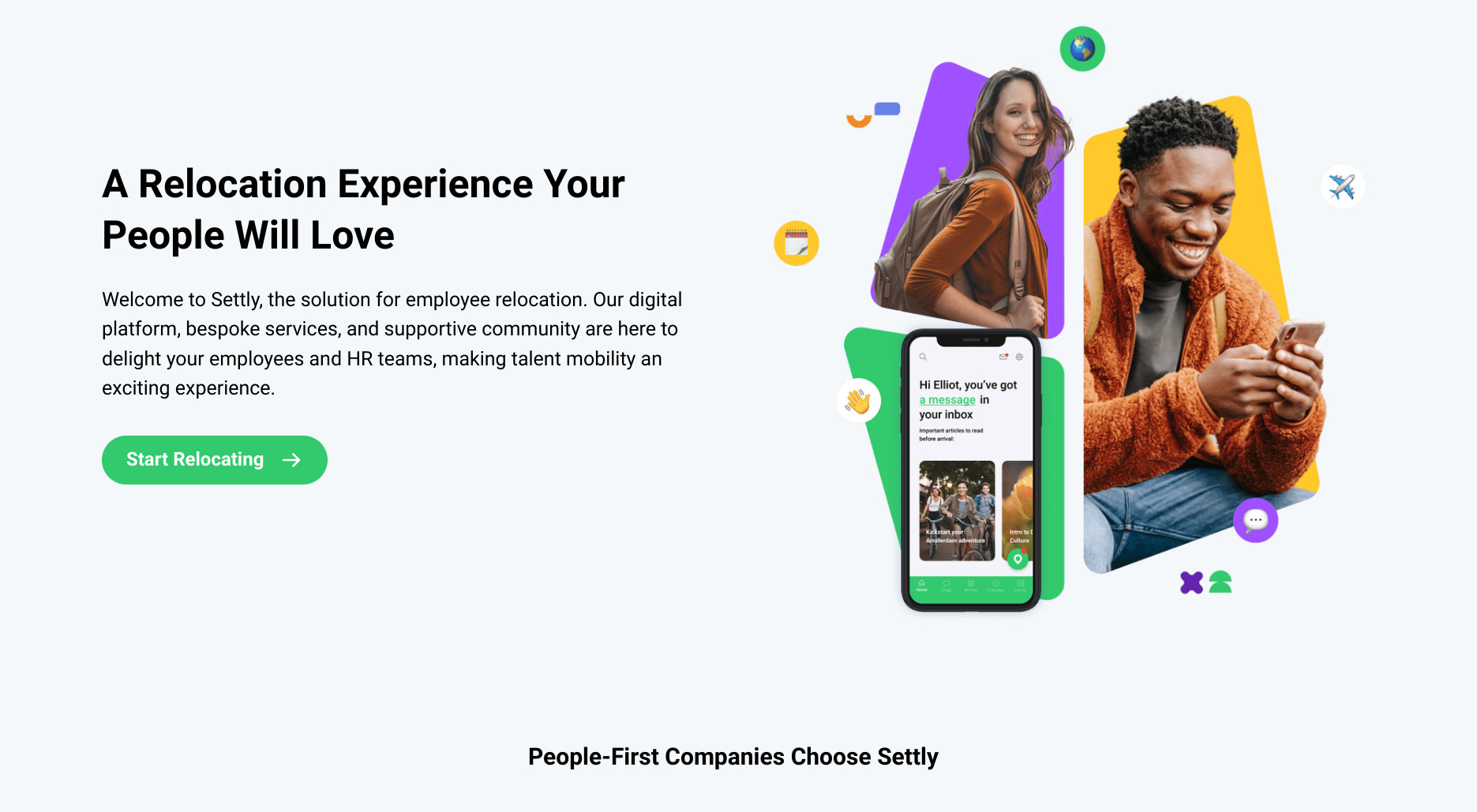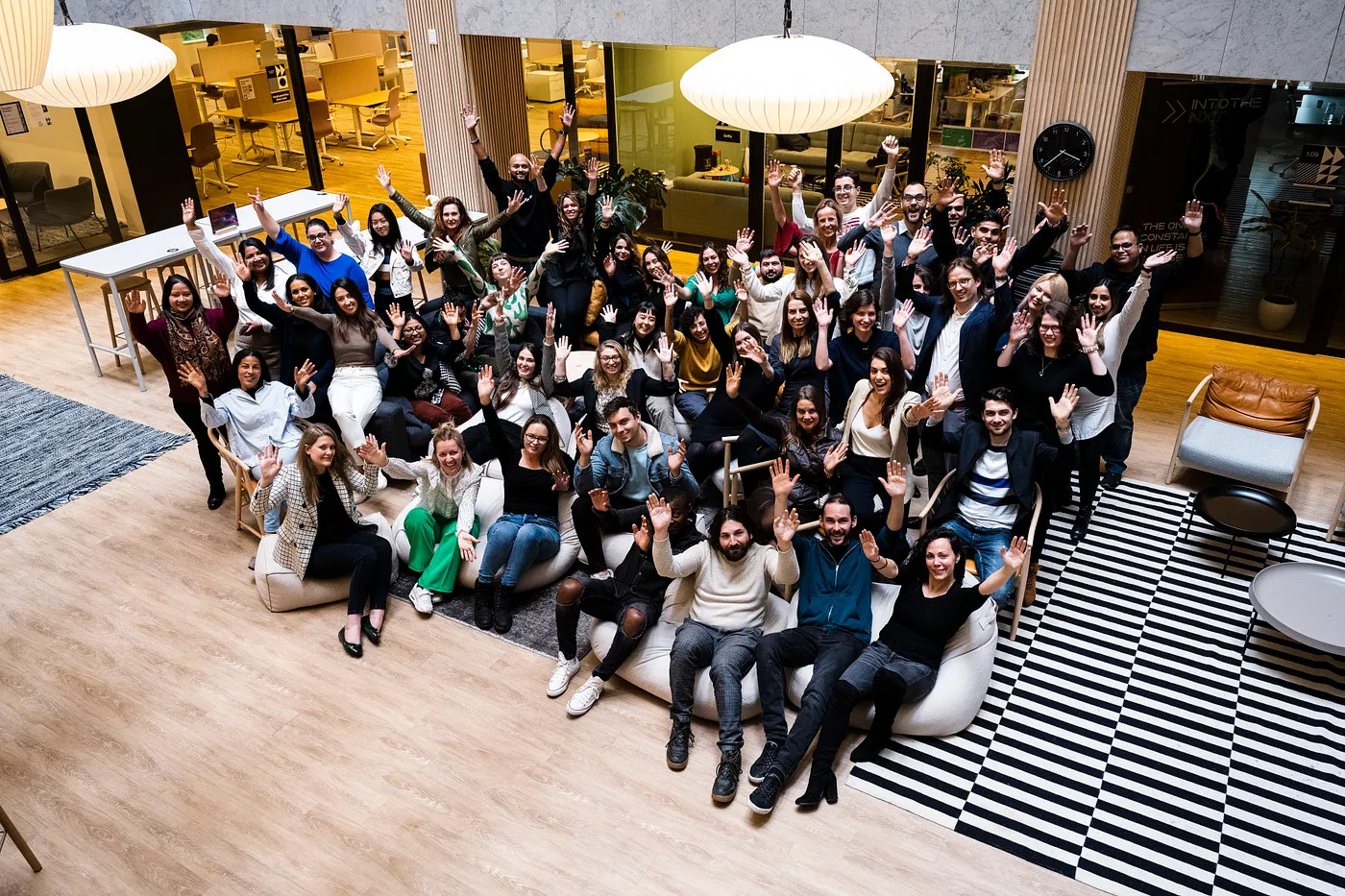September 28, 2023
How To Hire and Retain International Talent as a Dutch Scaleup

“Our new hires receive a complete package: immigration support, the 30% ruling, housing assistance, soft landing support, and a lump sum for items such as flights, schooling, and temporary housing.”
Within the Techleap for scaleup community, Marieke van Iperen stands out as arguably the foremost expert on the topic of hiring from abroad. She’s the Co-founder and CEO of Settly, an employee relocation platform. She’s also a member of Techleap’s Founder Advisory Board.
In this piece, she shares…

My name is Marieke van Iperen, and I’m the Co-Founder and CEO of Settly, a B2B employee relocation platform based in Amsterdam. I started Settly in 2019 with the mission of transforming the future of work, and creating a world where everyone feels at home. Prior to Settly, I worked in HR and Total Reward Leadership roles at Uber, PwC, Nike and other big companies across five continents.
Settly’s employee relocation platform helps HR teams save time and costs, by offering a seamless, personalised, and compliant end-to-end relocation solution that covers immigration, housing, tax, settling-in, and support. We focus heavily on the employee experience, and operate across many European and Asia-Pacific countries.
We were bootstrapped for our first 4 years, which we did purposefully to safeguard our culture, values, and product vision. We raised our first round of funding of €6M earlier this year, from 2050, the French Evergreen Impact Fund, and Mediahuis Ventures.
Settly was named as one of the top 5 fastest-growing bootstrapped startups in the world last year as we grew 350%.
We’ve grown rapidly to 60 employees (35 nationalities), with majority female across all levels, strong LGBTQI+ representation, and working from 7 different countries.
I’m really proud of the inclusive culture that’s been created by everyone on our team — it’s the driving force behind our growth and success. I’m also grateful for the 9.2/10 C-Sat and 70% NPS scores from our clients, and the social impact we’re making. Hearing success stories of relocated employees feeling at home in their new environments fuels our passion, and reminds us why we do what we do!

From day one. Our first hire, our founding developer, is from Peru. I’m a firm believer in Diversity, Equity, Inclusion, and Belonging (DEI&B) because it brings much needed diverse perspectives, enabling us to make the best decisions for growth and success.

That’s up to each company. Everyone is different and you should build a culture that fits your philosophy. Some thrive with remote, others with relocations, and some with hybrid. At Settly, we let our talent decide what works for them. One thing we have learned is that remote work for juniors doesn’t align with our current maturity level, so at Settly this option is only available for managers and above.
90% of our team is international, and we expect all our employees (including the Dutch ones) to be resilient, have a growth mindset, be culturally sensitive, and to embrace change. In our experience, these are all important characteristics for successful international hires.
We’ve made it part of our vision and values that we create a place where everyone feels at home.
At Settly, we kick off each Monday morning by celebrating individuals who live our values. We also start the week with fun activities that promote cross-cultural learning. Here we embrace everyone’s differences, which helps our leadership thrive in our diverse environment.
Building a diverse and inclusive culture takes time, but once you get it right, it can become a key driver of industry-leading performance. This has proven true for us, with strong talent retention, and an E-NPS rating of 70%.
We spend a lot of time on culture, values, and the importance of DE&I as part of onboarding. Further, we coach our managers so they can embed this into their 1:1s and lead by example, which is linked to performance management. Culture is something we create together.
40% of international hires fail due to lack of support, and this number goes up if there’s family joining, or if the are relocating to an emerging market. It’s important to offer a comprehensive relocation package that includes housing, settling-in, and schooling support (for families), in addition to the basics like immigration and the 30% ruling.
While the costs of relocation can seem significant, the benefits more than compensate, as we observe increased loyalty, retention, and engagement, especially for those moving from emerging markets.
In the Netherlands, you need to be a recognized sponsor with the IND in order to hire talent from outside the EU. This can be a very bureaucratic process that takes 6–18 months (depending on your business maturity and financials).
How to apply as a recognised sponsor: https://ind.nl/en/residence-permits/work/apply-for-recognition-as-sponsor
Once you have the IND’s seal of approval it’s pretty straight forward. Smaller startups will likely need to go through an EoR (Employer of Record) and/or a payrolling solution, like Remote — we use them for our international folks working outside of NL and they’re great.
Building a remote or hybrid culture takes more time and effort than when you have everyone in an office, but once you get it right, it will lead to stronger results. Creating a strong philosophy is key, as well as frequent check-ins by managers.
We use Slack for all our company communication and have many non-work-related channels, such as #dadjokes, pets, kids, and culture, to ensure everyone has a bit of fun during the day.
During our Monday morning weekly, we use Mentimeter, an interactive presentation app. We pair people from different countries and departments to pose 5 questions to the entire team. The topics can range from movies to culture to food. It’s a simple yet fun way to engage the team and learn more about each other. Casual conversation is important — asking non-work-related questions helps build and nurture relationships.
We encourage a minimum of 3 daily scrum sessions a week, with an ideal goal of 5, and organise 2 company events each year where we bring everyone together. Additionally, I conduct all my calls virtually, even when I’m in the office, to ensure everyone in my team has the same experience.
Listening, understanding their priorities, conducting frequent pulse surveys like e-NPS surveys, skip level check-ins, and making sure their voices are heard and followed up with actions.
From an immigration perspective, the speed in which you can get a visa approved in comparison to neighbouring countries is quite good. Additionally, student and partnership visas help simplify the process of relocating or hiring international talent. Of course, The Netherlands also has the 30% tax ruling, a huge benefit that makes moving to the Netherlands more attractive (more on that below).
From a less formal perspective, the quality of life in NL is an important factor, particularly in terms of safety, security, and access to health care and education, which attracts people from emerging markets. When developing your hiring strategy, these factors should not be overlooked, especially for specific markets.
Further, Dutch proficiency in English makes settling-in so much easier for many international hires. However, it is worth noting that the Dutch can be reserved, so providing support for your talent’s cultural integration is crucial for retention.
From the start we focused on people and culture, and DEI&B are cornerstones to our mission and DNA. So making sure our internationals felt at home was never a challenge.
However, one thing we did notice as we’ve grown from 1 nationality to 35 in just 4 years, is increased complexity in making sure everyone understands each other. This rapid growth prompted us to hold a valuable session during our recent company event, which focused on helping individuals grasp and navigate the nuances stemming from differences in culture, perceptions, backgrounds, and interpretations.
Great examples emerged with team members holding multiple nationalities and having been raised in various countries and cultures. These experiences profoundly influence their outlook on life, work, and relationships. It’s crucial to be attentive and aware of these factors when expanding an international team and shaping and evolving your company culture.
The 2023 Dutch Employee Relocation Benchmark Report — Our Report
Deloitte Future of work — Whitepaper
Future of work trends — KornFerry
In the Netherlands 65% of companies struggle to find local talent. The 30% ruling allows companies to compete on a global scale, hence increasing their recruitment pool by 118x. This allows them to not only speed up their time to hire, but also attract the best possible talent to help achieve their goals. There simply is not enough local talent to fill the positions that need to be filled. At Settly we have 35 nationalities, and 80% of our team was born outside The Netherlands. Had we not had the 30% ruling as a benefit we offer, we would not have been able to achieve our growth and success so far.
Given the rapid growth of the IT sector in recent years and its projected continuous expansion, including an estimated 4% growth in 2024, the talent market is expected to remain fiercely competitive. Emerging technologies like AI are further fueling this competition for skilled professionals.
Many EU countries have favourable tax rulings. For example, Spain has a tax rate of 19% for internationals vs. a top rate of 47% for locals. Portugal has 20% for internationals vs. a top rate of 48% for locals. Belgium has looked across the border for inspiration, and now has a 30% ruling as well. Italy has experienced a brain drain of its best and brightest for years and has recently handed out a 70–90% tax break for the first 5 years. Not to mention eastern European countries, which have default competitive tax rates (Estonia 20%, Czech 22%, Hungary 15%, Slovakia 25%).
The 30% ruling, alongside our great standard of living, has been a key differentiator for companies to hire international talent in The Netherlands.
Without the 30% ruling, the cost of hiring talent will significantly increase, which will have a huge impact on the Dutch economy. Without it, many companies will simply not be able to afford to hire internationals, leading to missing their goals and targets. It will also increase the probability of being outperformed by other countries that have tax benefits to attract and retain international talent.
The appeal of the Netherlands as a destination is likely to decrease notably without the 30% ruling, given that our income tax rates are relatively high compared to other countries. This will substantially affect the cost of living calculation when individuals are considering job offers from various countries.
More on why it’s so important:

 Meet Pole Position Batch #5 focusing on Greentech companies
Meet Pole Position Batch #5 focusing on Greentech companies